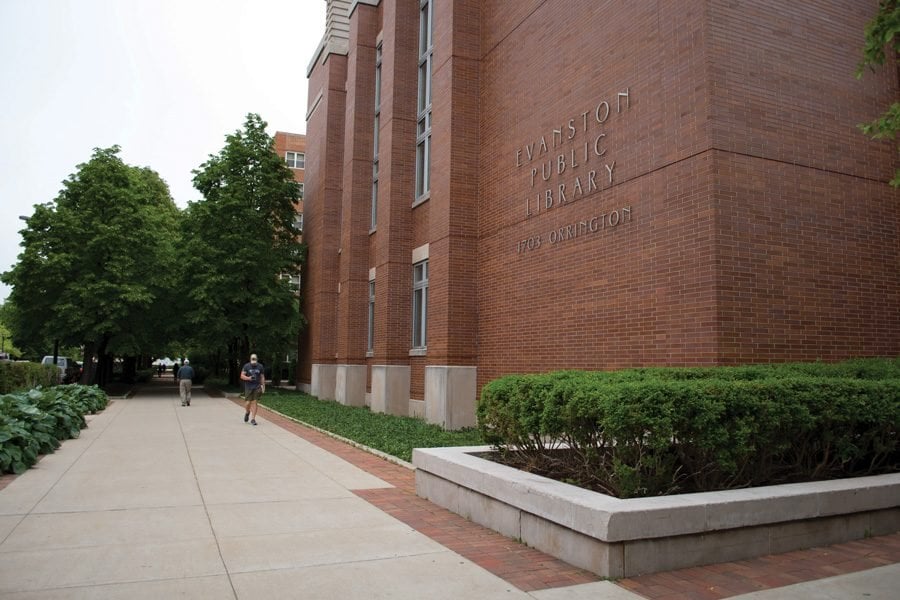EPL’s “All We Can Save” book group highlights intersectionality between feminism and climate change
Daily file photo by Allie Goulding
Evanston Public Library. EPL’s book circle “All We Can Save” looks at climate change through a feminist lens.
April 18, 2022
Evanston Public Library’s spring virtual book group, named “All We Can Save” explores climate feminism, a term that describes how patriarchical structures contribute to climate change.
The group, which is part of the global “All We Can Save Project,” meets every other Wednesday evening for ten meetings, starting in March and running until July. At these meetings, Evanston residents of all ages dig into sections of the book “All We Can Save” by Ayana Elizabeth Johnson and Katharine Wilkinson as part of a global discussion series.
First, the book describes American scientist Eunice Newton Foote in her journey as a climate feminist. It then delves into how the movement erupted: an attempt at preventing the patriarchial power structure — one that stifles girls, women and nonbinary people — from continuing to destroy the natural world.
EPL Branch Assistant Beatriz Echeverria, said climate feminism centers around prioritizing people over profit.
“To dismantle the current system, a new older approach has to be taken,” Echeverria said. “I think feminism might be one.”
Echeverria is also a member of environmental activism group Citizens’ Greener Evanston and a founder of Evanston’s Repair Cafe, a space where residents can access technical repair for household objects using recyclable materials. She said she enjoys anything to do with sustainability.
Rachel Rosner, a book club member and board president of Citizens’ Greener Evanston, said each meeting aligns with a new section of the book.
The first section, titled “Root,” describes the interconnectedness between humans and nature, which coincides with Indigenous wisdom, she said.
In a chapter titled “Indigenous Prophecy and Mother Earth,” lawyer and Indigenous human rights activist Sherri Mitchell explains that keepers of Indigenous knowledge carry extensive data on climate changes, migration patterns, medicinal plant properties and quantum physics.“The common thread of Indigenous wisdom is also an exciting piece that people in our group were really excited about,” Rosner, program consultant for It’s Our Future, an organization dedicated to climate justice, said. “More (group members) are (now more) interested in heeding that wisdom that was erased through colonialism.”
The program’s registration is currently closed so a static community can be built throughout the full ten sessions, according to Rosner. Still, Echeverria said she feels the group would benefit from more racial diversity.
She said minority communities are more likely to be disproportionately affected by climate change. According to an Environmental Protection Agency report last September, the nation’s most socially vulnerable populations are more likely to reside in areas with elevated pollution, increased heat waves and heightened chances of flooding, among other risks. Zoning often forces people of color into these areas, leaving them vulnerable.
Younger members of the group, according to Echeverria, are more aware of these societal injustices.
“Younger people … know this as a fact and are very aware that frontline communities are going to be disproportionately affected and are the least responsible for it,” she said. “But there are other people that might have been old school environmentalists that this is new to them.”
Nonfiction books on climate change are typically too depressing for Echeverria, she said, because they don’t offer solutions. Still, some members of the book club are motivated by the work that climate activists have done so far.
Martha Meyer (Weinberg `83), a library assistant at EPL and a participant in the book club, said in an email to The Daily she was moved by the book and hopes people remain courageous in the face of climate change.
“I think hopelessness is just where the fossil fuel industry wants us to be,” Meyer said in the email.
Meyer added she is encouraged and moved by the work that Evanston residents, many of them women, have done for the climate.
To Echeverria, combattance of climate change has much to do with feminism. She said in contrast to patriarchy and capitalism, which to her go hand-in-hand, feminism is about collaboration and the breakdown of hierarchies.
“Feminism … is more about working for a common goal that supports versus excludes others,” Echeverria said. “Understanding feminism is a better alternative to the way we should relate to each other and to the planet.”
Email: [email protected]
Twitter: @swarthout_iris
Related Stories:
— D65 parent climate action team advocates for institutional climate change strategies












